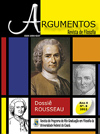The displacement of the social place of negation in Herbert Marcuse
Keywords:
Negação. Princípio de realidade. Emancipação instintiva.Abstract
O pensamento de Marcuse é profundamente marcado pela tradição dialética. O conceito de negação, no entanto, adquire significados específicos em sua teoria. Se o mérito de Hegel é o de ter descoberto a negação enquanto princípio motor e criador da história, já em Marx ela passa a ser entendida enquanto processo social de transformação. Por isso, o proletariado, enquanto portador dos sofrimentos universais, adquire centralidade negativa na teoria de Marx. Marcuse, por sua vez, inova ao ampliar o lugar social da negação. Ao afirmar que a totalidade pode ser negada desde fora do sistema, sugere que não se trata de substituir uma totalidade por outra, mas de instigar um novo princípio de realidade.
Downloads
Published
Issue
Section
License
Argumentos magazine is licensed under an International Creative Commons Attribution License.
The Magazine uses CC BY inclusion
1) The authors retain the copyright granted to the magazine or the right to initial publication, with the work regularly licensed under the Creative Commons Attribution, which allows the sharing of the work with acknowledgment of authorship and initial publication in this magazine.
2) The authors are authorized to contract additional applicable contracts, for non-exclusive distribution of the version of the work published in this journal (for example, publication in the institutional repository or as a chapter of the book), recognition of authorship and initial publication in this journal.
3) Authors are authorized and encourage to publish and distribute their work online (for example, in institutional repositories or on their personal pages) at any time before or during the editorial process, as they can generate productive changes, as well as increase the impact and reference of published work.




.jpg)










._._3.png)
1.jpg)
._._._.png)
